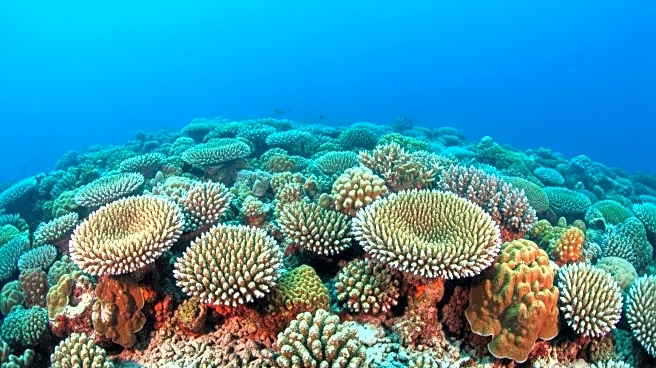What is the story about?
What's Happening?
The 2025 Global Tipping Points Report, released by the University of Exeter and international partners, has identified that the world's warm-water coral reefs have crossed their thermal tipping point due to rising ocean temperatures. This development places these ecosystems at significant risk, as higher temperatures lead to coral bleaching—a process where corals expel the symbiotic algae essential for their survival. The report highlights that since January 2023, bleaching-level heat stress has affected 84.4% of the world's coral reefs, marking the largest global coral bleaching event on record. The findings were presented as global ministers convened in Brazil to prepare for the upcoming UN Climate Change Conference, emphasizing the urgent need for action to curb global warming.
Why It's Important?
The crossing of the thermal tipping point for coral reefs signifies a critical moment in the fight against climate change. Coral reefs are vital to marine biodiversity, providing habitat and food for numerous marine species. Their decline could lead to significant disruptions in marine ecosystems, affecting fisheries and coastal communities reliant on these resources. The report underscores the need for stringent emission mitigation and enhanced carbon removal strategies to stabilize global temperatures and preserve coral reefs. Failure to address these issues could result in irreversible damage to marine environments, impacting global food security and economic stability in regions dependent on marine resources.
What's Next?
The report calls for immediate action from global leaders to implement policies that reduce emissions and promote coral resilience. Strategies such as genetic modification to enhance coral resilience and efforts to improve water quality are being explored. However, these measures require substantial investment and international cooperation. The upcoming UN Climate Change Conference presents an opportunity for nations to commit to meaningful climate action. Scientists and conservationists are urging stakeholders to prioritize coral reef preservation in climate negotiations, emphasizing the need for collaborative efforts to mitigate the impacts of ocean warming.
Beyond the Headlines
The decline of coral reefs raises ethical and cultural concerns, as these ecosystems hold significant cultural value for many coastal communities. The loss of coral reefs could lead to cultural erosion and displacement of communities that have historically depended on these ecosystems. Additionally, the report highlights the broader implications of climate change on global biodiversity, stressing the interconnectedness of ecosystems and the cascading effects of environmental degradation. The findings serve as a stark reminder of the urgent need for comprehensive climate policies that address both environmental and social dimensions.














